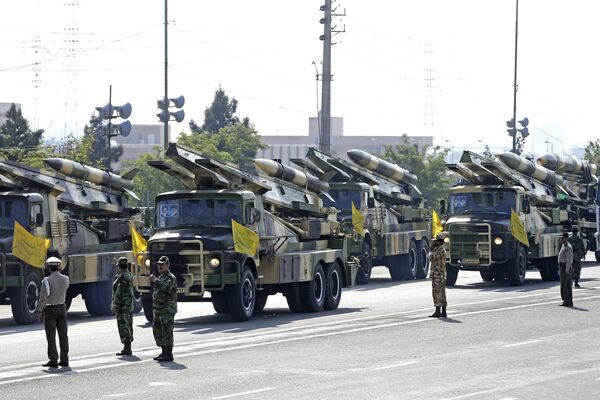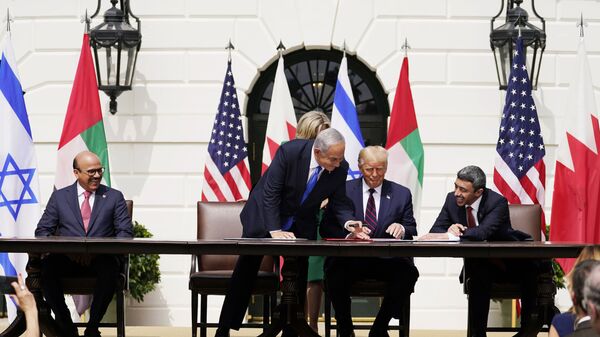The Abraham Accords are the only policy launched by Donald Trump which Joe Biden wants to keep once he arrives at the Oval Office in January, according to Axios. However, it does not mean that the incoming Biden administration will adhere to Trump's playbook, the news website remarks: it may try to use additional deals to induce Israel to take steps towards a "two-state solution" to the longstanding row between the Jewish state and Palestinian Arabs.
Besides this, the Abraham Accords "have strings attached" which could make the future Biden administration "uncomfortable", remarks The Jerusalem Post, referring, in particular to the potential sale of Lockheed Martin F-35 Lightning II Joint Strike Fighters to the United Arab Emirates (UAE), the removal of Sudan from Washington's terror list, and the recognition of Morocco's sovereignty over Western Sahara. The Abraham Accords participants earlier insisted that the agreements in question should be seen separately from the peace accords.
To date, four Muslim Arab countries have signed peace deals with Israel within the framework of the Abraham Accords brokered by the Trump administration and many more are apparently considering jumping on the peace process bandwagon.
How the Abraham Accords Affect the Middle Eastern Balance of Power
The peace accords have made the situation in the Middle East even more complicated by breaching old stalemates and creating new ones, says Sara Sherif, a political analyst and Israeli affairs journalist at Al Dostor newspaper.
"On the one hand, the agreements have changed the situation that has existed for decades, preventing the normalisation between Israel and the Arabs before the settlement of the Palestinian issue and the Israeli return to the 1967 lines. Today we are facing a new situation and new alliances in the region," she emphasises.
The Arab world, which was worried about the United States' exit from the Middle East under Trump, "has found in Israel a new connection with the United States and restored confidence that Washington has not abandoned them," according to the analyst.
On the other hand, the agreements contribute to the "besieging" of Iran by the new bloc that includes Israel and the Arab countries and left the Palestinians out in the cold, the journalist admits.
"This situation has facilitated the growth of the Turkish-Iranian influence inside the Palestinian lands, which means an increase in the level of heat that already exists between the Gulf States, Iran and Turkey," notes Sherif.

Palestinian Issue: Is a Two-State Solution in Play Again?
The Biden administration's push for a two state solution can become a game changer for Palestinian Arabs, Sherif belives.
"Biden believes in the two-state solution and the establishment of a Palestinian state living in peace and security alongside Israel, and he believes that the two-state solution is the idea that the US policy should adopt in resolving the conflict between Israel and the Palestinians", she says, suggesting, however, that "this idea will not be his top priority, at least in the first year of his presidency".
The journalist highlights that Biden is expected "to take steps to restrict Israel" from preventing the implementation of the "two-state solution". She refers to such policies as canceling the incorporation of the West Bank or halting the expansion of settlement construction.
"The Biden administration will adopt Trump's regional policy of normalisation, and will try to move forward with peace agreements", she believes. "Biden will encourage Arab and Islamic countries to continue the process of normalisation with Israel, but he may at the same time try to push a solution to the Palestinians, and there will be no free gifts to Israel as there was in Trump time".

Will Biden Cut the "Strings" Attached to Abraham Accords by Trump?
Meanwhile, Sherif expresses scepticism with regard to the assumption that Joe Biden may cut all the "strings" attached to Abraham Accords by President Trump.
"It is unlikely that Biden will backtrack on the two steps toward the UAE and Bahrain, especially since Saudi Arabia decided to postpone its decision to normalise until after the American elections," she suggests. "If [Riyadh] makes peace with Israel, this will be a great achievement for Biden in his first months."
Sherif expects that the Democratic Party may find itself on the horns of a dilemma over Saudi Arabia's potential request to purchase F-35 fighter jets from the US, as Team Biden has reservations about Riyadh's human rights issues. Earlier, Saudi Crown Prince Mohammed bin Salman signalled that he would like to acquire the advanced stealth fighters from the US.
The US-UAE arms deal should be seen in the context of Biden's probable normalisation with Iran, according to the analyst. She believes that the Biden administration may green-light the sale of F-35 jets to Abu Dhabi in order to reduce tensions with Persian Gulf monarchies over Washington's projected return to the Iran nuclear deal.
"As for Western Sahara, there are possibilities that the US administration will reverse its decision, especially since its decision is not recognised internationally," the journalist notes. "Or at the very least, it announces that it is awaiting a UN decision, which will decide the matter as a conflict zone."
Joe Biden’s future Middle Eastern policy will be much different from that of Donald Trump, deems Sherif.
"Perhaps we will see again the United States that we knew: talks about human rights files in the Middle East will return, the talk about the nuclear deal with Iran will return," she says.
On the other hand, she suggests that the US will continue its policy of withdrawal from the Middle East, due to the fact that Biden's major focus could be on restoring America’s relationship with the European Union and international organisations, and addressing the economy after the coronavirus crisis. The aforementioned goals will have priority before the Middle East issues, the political analyst concludes.




